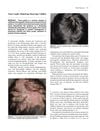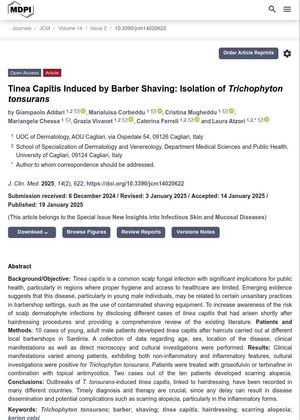TLDR Unsanitary barber practices can spread scalp infections, treatable with oral antifungals.
The study examines tinea capitis outbreaks in 10 young adult males in Sardinia, linked to barber shaving practices, identifying Trichophyton tonsurans as the causative agent. Symptoms included erythematous-scaling patches and severe kerion celsi, with two cases resulting in scarring alopecia. Treatment with oral antifungals like terbinafine or griseofulvin was effective, resolving symptoms in 4-6 weeks. The study underscores the role of unsanitary barber practices in spreading the infection and stresses the need for improved hygiene in barbershops. Despite its small sample size, the study calls for increased awareness and larger studies to better understand the prevalence of T. tonsurans.
 9 citations
,
October 2013 in “Pediatric dermatology”
9 citations
,
October 2013 in “Pediatric dermatology” Proper antifungal treatment is crucial to avoid misdiagnosis and prevent scarring alopecia.
 21 citations
,
February 2009 in “Journal of the American Academy of Dermatology”
21 citations
,
February 2009 in “Journal of the American Academy of Dermatology” Some cases of tinea capitis, a fungal scalp infection, can look like scarring hair loss due to the body's immune response and the fungus itself.
 January 2025 in “Journal of Fungi”
January 2025 in “Journal of Fungi” Advanced dermoscopy techniques improve diagnosis and treatment monitoring for Kerion celsi but don't guarantee full hair regrowth.
May 2024 in “Journal of Fungi” Tinea capitis in adults, especially postmenopausal Black women, needs prompt treatment with oral antifungals to avoid scarring.
1 citations
,
January 2024 in “Journal of clinical medicine” Early recognition and treatment of tinea capitis are crucial to prevent severe scalp issues and prolonged therapy.
 65 citations
,
January 2005 in “American journal of clinical dermatology”
65 citations
,
January 2005 in “American journal of clinical dermatology” Children with scalp fungal infections need proper diagnosis and treatment, usually with antifungal medications, and newer drugs may offer quicker recovery.




